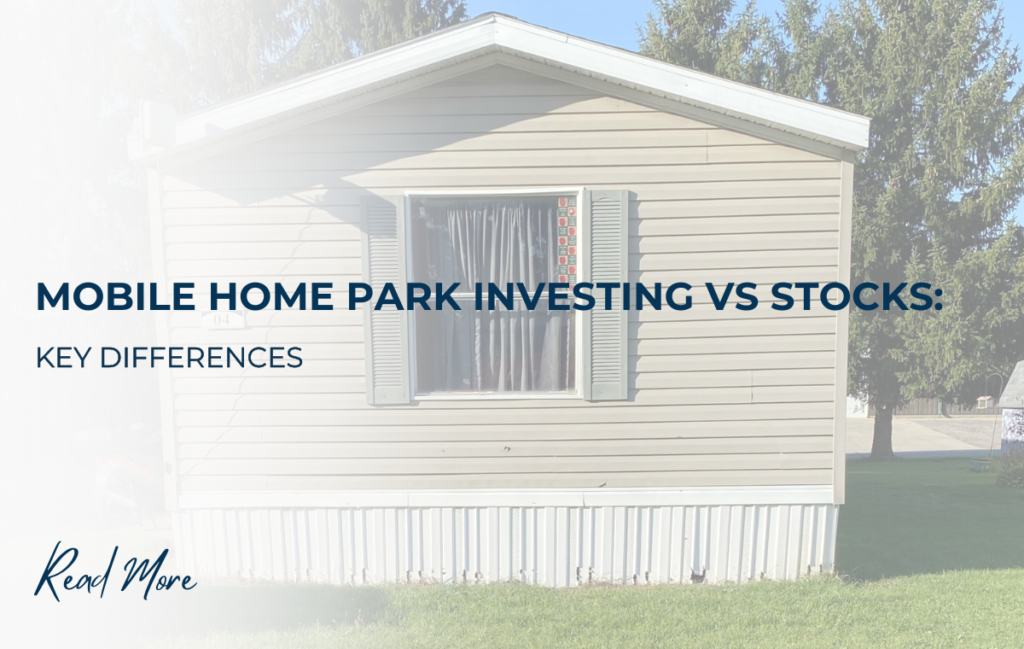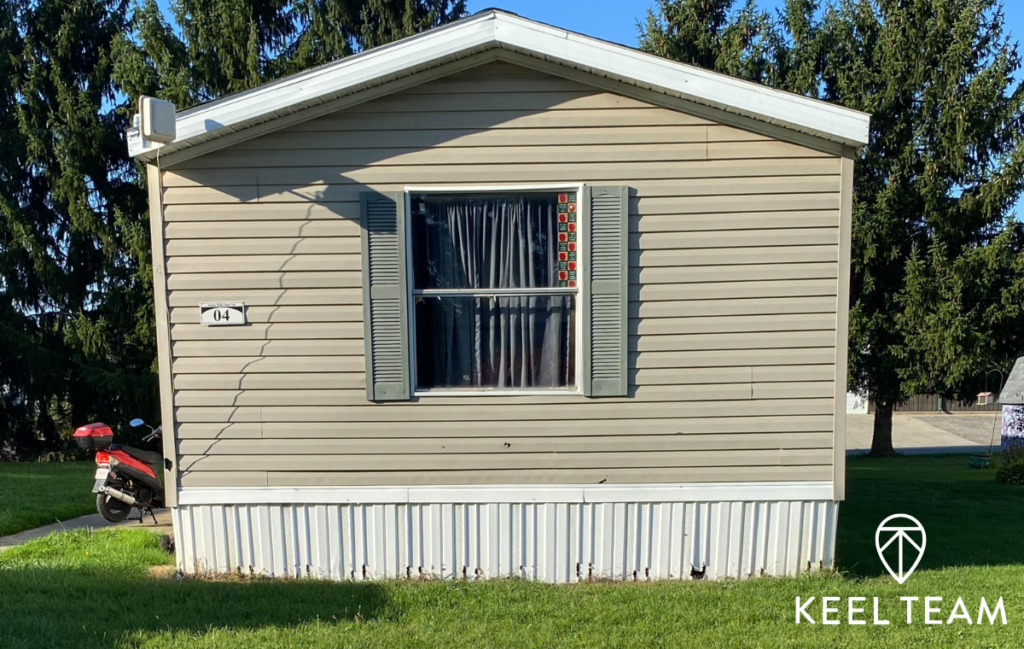Mobile Home Park Investing vs Stocks: Key Differences
-
 Tristan Hunter - Investor Relations
Tristan Hunter - Investor Relations

Investing is a critical decision that can shape your financial future, and understanding the differences between various options is crucial. While many people lean towards stocks, it’s worth considering mobile home park investments as an alternative. This post will dive into the key differences between stocks and mobile home park investing, discussing why mobile home parks may provide an attractive option for some investors.
Stocks: A Speculative Investment
Stocks have long been a popular choice for investors, with promises of high returns and future growth. However, investing in stocks often involves speculation. Stock certificates may represent ownership in a company, but their value can be highly volatile. Many companies, especially those that no longer exist or are no longer profitable, have left investors with essentially worthless pieces of paper.
For example, historical stocks like the Pennsylvania Railroad Company or King’s Department Stores may have once seemed valuable, but today, they are worth nothing. The reason for this loss in value lies in the performance of these companies. They didn’t generate consistent profits, pay dividends, or survive the market’s challenges.
Stocks are often driven by market sentiment rather than the actual performance of the underlying business. In some cases, this means investors are betting on the future success of a company rather than its current financial stability. For example, popular companies like Tesla have skyrocketed in stock price, but they don’t always deliver direct financial returns to shareholders in the form of dividends.
The Nature of Stocks: Speculation Over Stability
The stock market can be described as an investment vehicle built on speculation. Stock values fluctuate based on public perception and speculation about a company’s future performance. Even the most successful companies may not provide tangible financial returns through dividends. The value of stocks tends to rise based on market hype, making them an uncertain investment during volatile economic conditions.
For example, the success of many stocks depends largely on public perception and hype. While the stock price may increase, this doesn’t necessarily mean the company is generating substantial revenue for its investors. This speculative nature of stocks can lead to significant financial risks, especially when companies fail to meet expectations or face economic downturns.
Mobile Home Park Investing: A Tangible Cash Flow
In contrast to the speculative nature of stocks, mobile home park investing is rooted in tangible cash flow. Investors in mobile home parks can expect consistent revenue streams from tenant rent payments. Unlike stocks, mobile home parks generate income based on the actual monthly rents collected from residents.
Each month, mobile home park owners collect rent, pay expenses, and keep the remaining revenue. The value of a mobile home park is determined by its ability to produce cash flow. This is where cap rates, a key metric in real estate investing, come into play. Cap rates represent the return on investment based on the net income produced by the property.
In general, cap rates for mobile home parks range from 5% to 15%. The higher the cap rate, the more income the investment generates relative to its cost. This clear relationship between income and investment value is a stark contrast to the speculative nature of stocks.
Why Mobile Home Parks Provide Stability
Mobile home parks offer investors the opportunity to invest in something tied to real cash flow. With stocks, you are often betting on future growth that may or may not occur. On the other hand, mobile home parks provide regular income, making them a more stable investment option.
During uncertain economic times, the stability of an investment becomes more important. Mobile home parks tend to fare well in recessions because they provide affordable housing, which remains in demand. This high demand for affordable housing helps ensure that mobile home park investments continue to produce income, even during economic downturns.
As the market becomes more unpredictable, many investors may seek alternatives to stocks. Mobile home parks offer one such alternative, providing both stability and the potential for long-term growth. While no investment is guaranteed, the tangible nature of mobile home parks typically offers a more secure option for some investors.
Download our FREE eBook and explore the Top 20 things Andrew Keel recommends you consider before investing in mobile home parks.

The Role of Cap Rates in Mobile Home Park Investing
Cap rates are a critical aspect of understanding mobile home park investing. They provide a measure of return on investment, allowing investors to compare the income generated by different properties. A higher cap rate means the property is producing more income relative to its value, making it a potentially more attractive investment.
For example, if a mobile home park has a cap rate of 10%, this means it is generating a 10% return on investment based on its net income. Investors can use this metric to assess whether a mobile home park is worth purchasing, as it provides insight into the potential income the property can produce.
Unlike the stock market, where returns are often speculative, mobile home park investments allow investors to estimate their expected returns based on real income figures. This transparency can provide investors with more confidence in their investment decisions.
Mobile Home Park Investing in a Recession
As the economy faces potential recessions, mobile home parks become an even more attractive investment. Historically, affordable housing performs well during economic downturns because people are looking for cost-effective living options. Mobile home parks provide this solution, making them more resilient to market volatility.
During recessions, stocks can be especially risky as market sentiment often drives down stock prices. Investors in mobile home parks, however, can still collect rent from tenants, which helps ensure that they maintain cash flow during difficult economic periods. This can offer a sense of security that many stock investments lack during times of uncertainty.
Diversifying Your Portfolio
Mobile home parks can be a great way to diversify your investment portfolio. By adding real estate investments like mobile home parks, you are less reliant on the stock market’s ups and downs. This diversification can help reduce overall risk and provide a more balanced approach to investing.
Mobile home park investments provide income that is not directly tied to the fluctuations of the stock market. This can offer a layer of protection during economic downturns when stock prices may plummet. Additionally, the consistent cash flow from mobile home park rents can serve as a reliable source of income, especially during periods of economic instability.
Conclusion: Consider Mobile Home Park Investments
While stocks can offer growth potential, they are often speculative and subject to significant fluctuations in value. Mobile home park investments, on the other hand, provide a more stable, cash-flow-based alternative. The clear relationship between income and property value makes mobile home parks a potentially attractive option for investors looking for tangible returns.
No investment is risk-free, and it’s essential to carefully evaluate your options. However, for those seeking stability and consistent income, mobile home parks might be worth considering as part of a diversified investment strategy.
Are you looking for more information on mobile home park investing and ways to potentially generate cashflow? Book a call with Andrew Keel, and learn how you can scale your business TODAY!
Disclaimer:
The information provided is for informational purposes only and is not investment advice or a guarantee of any kind. We do not guarantee profitability. Make investment decisions based on your own research and consult registered financial and legal professionals. We are not registered financial or legal professionals and do not provide personalized investment recommendations.

Tristan Hunter - Investor Relations
View The Previous or Next Post
Subscribe Below 👇





